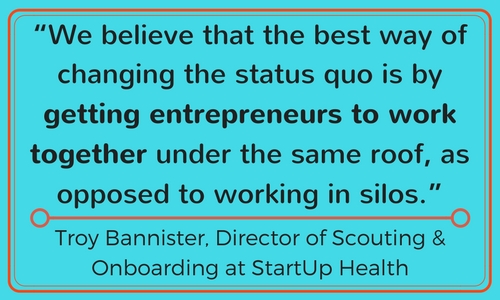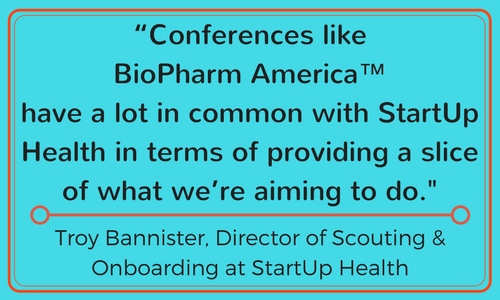StartUp Health’s Troy Bannister reveals the secret formula to transformative digital health companies


Partnering Insight recently interviewed Troy Bannister, Director of Scouting & Onboarding at StartUp Health, a global organization leading the movement to transform digital health. StartUp Health has the world's largest portfolio of digital health companies.
TRANSFORMING THE STATUS QUO
Founded in 2011 with the idea of organizing and investing in a literal army of thousands of entrepreneurs passionate about reinventing the future of health, StartUp Health has a unique imperative to search for entrepreneurs who are dissatisfied with the healthcare status quo in US. There are a lot of issues with healthcare today. At StartUp Health, “we believe that the best way of changing the status quo is by getting entrepreneurs to work together under the same roof, as opposed to working in silos,” said Bannister. “We call these entrepreneurs ‘Health Transformers.’”
The healthcare sector has always been a competitive landscape, but advances in technology and value-based care have opened opportunities to build a new framework to house a community of people trying to achieve the same mission.
“We search globally for stellar people doing innovative things in healthcare, anything from the business of a hospital to the diagnosis of health disorders,” said Bannister. “Anyone you bring together has a network or a perspective that is of value to another entrepreneur. It’s my job to find out where they are and what they are doing and bring them together.”
FROM FRUSTRATION, OPPORTUNITY
The most interesting people often travel unconventional roads. Bannister was an EMT in college when he fell in love with medicine and healthcare. As an EMT, he witnessed the power of medicine, people being resuscitated following cardiac arrest, and was inspired to switch his major to medicine. But after two years in medical school, Bannister found himself frustrated with the healthcare system and the constraints and parameters inherent to a practicing physician.
“I determined that I would be a very unhappy practitioner and took a step back to see what I could do to change the way it was,” said Bannister.
Bannister changed gears and after receiving a dual Master of Science from Georgetown in Physiology & Biophysics, he found his way to Mount Sinai Health System to do clinical research. “I saw companies come through Mount Sinai through StartUp Health, found out what they were doing, and joined them,” said Bannister.
GROOMING THE SUCCESS MINDSET
The philosophy at StartUp Health is that in order to build a great company, you must think like a transformative entrepreneur. Fundamental to this is the Health Transformer Mindset, eight traits essential to enable entrepreneurs to build companies that become magnets for talent, partners and capital.
“You have to have a good mindset to make good decisions, to start talking and thinking about your vision in the right way in order to turn your idea into something sustainable,” said Bannister. These eight traits boil down to:
- Long term commitment. A lot of entrepreneurs fail because they give up, but those that succeed do so because they stayed at it.
- Building relationships.
- Having a rhythm, and being open to changing their business model.
- Having ambition and confidence in their vision.
- Being self aware, i.e., coachability. If multiple people tell you to think about something, then you should probably consider it.
- Healthy habits. Bannister has seen a lot of entrepreneurs burn out from pushing the boulder up the hill.
- Never taking gain for themselves. You don't hear a lot about entrepreneurs taking vacations. But instead of worrying about losing your slice of the pie, refocus on making your slice of pie more valuable.
- Batteries included. This is an often-used phrase at StartUp Health to describe people who walk into room and give off energy as opposed to people who walk in and suck all the energy out.
BUILDING SUCCESSFUL COMPANIES
A very similar process is used for grooming companies with the idea that if you can embody the transformer mindset, you will have earlier success and more time for building a company.
“It’s important to have a master plan and a story,” said Bannister, including a two-sentence overview of what you do and why it’s important. “Imagine going to an investor who hears a dozen pitches a week— are they going to respond to a long, drawn-out presentation or to the visionary with a story about how to impact healthcare overall? We work a lot with entrepreneurs on their presentation and story.”
It’s also critical to have a backable team, said Bannister, and a differentiated brand, both the look and sound of the brand. Another component is increasing traction, showing people where you are going and your progress toward getting there. And finally, it’s key to have a business model that works.
“One important thing I learned early on, if you look at UBER, they didn't invent the GPS system, they just built a great model around it,” said Bannister. “It’s not necessarily about inventing a new technology; it’s about using it within a great model.”
Other success factors for companies include having proprietary technology, forming partnerships, and having capital to execute.
“We get a lot of founders looking for money before adjusting their mindset,” said Bannister. “To me, that is backwards. It’s better to have an entrepreneurial mindset that exemplifies commitment and ambition, and by going through those steps, you are going to get money. Investors are going to want to give it to you. It’s about making your business better and the money will show up.”
MONEY FOR VALUE
As the onboarding leader for Startup Health, Bannister comes in contact with new innovations and trends in the digital health startup world poised to reinvent the future of health. In this role, Bannister authors StartUp Health Insights quarterly report to identify where is money is flowing and what it means.
“We have had an interesting first half of the year so far that has superseded what was achieved in just three quarters last year,” said Bannister. “There is lots of money flowing in but it is being distributed in different ways than before, with most of the money going to a small number of companies.”
So far this year there were ten deals over $100 million, with the majority of financing going to one to two companies at a time.
“Investors are learning what is working and what is not working,” said Bannister. “The experimentation phase is over. These companies have proved themselves to be valuable. We are not seeing a lot of IPOs. The public market is not great for health right now, as you can see from Fitbit and MINDBODY, two companies that went public and are underperforming. It’s better at this time to stay private.”
There was a flurry of companies that popped over the last five years to meet a current market need. Initially they were thought to have a lot of value, but the new companies are more clinically oriented and innovative with more sophisticated technology.
“We're seeing insurance go through innovation, as well, and with Congress up in the air about healthcare outcomes, companies like Oscar health insurance and Clover health are able to digitize their services, and offer more information to insurance companies to leverage high costs,” said Bannister. “They are trying to survive and make it through to create a more socialized healthcare system. A lot of big insurers are getting pushed out, and we won’t know what will happen until the federal government makes a decision.”
Overall, Bannister is seeing a lot more investors enter the space. In the first half of 2017 there were 583 unique investors, compared to 865 in total last year. “That means we are already three-fourths of the way compared to last year in terms of unique investors,” said Bannister. “There are more investors in digital health than ever. It’s good to see.”
TRANSFORMATIVE DEALS IN DIGITAL HEALTH
In 2017, there were some key benchmark deals that took place to advance digital health technologies. Three in particular stood out:
Grail: Perhaps the biggest deal ever seen at $914 million. Grail is going after cancer by performing liquid biopsies in the blood to look for tumor DNA. They take random samples of blood to diagnose tumors at an early stage and to get information about tumors. Their big aspiration is to use millions of tumor DNA samples to break the tumor genome toward finding a cure for cancer.
Outcome Health: A $600 million deal this year focused on in-hospital patient education. They have big plasma screens in doctor offices with 3D content that explains what is happening in your body. Patients get a visual explanation. They have proven great outcomes in patient adherence to care pathways. The vision is to reduce the billions of dollars incurred in the healthcare system from patients not taking their medicines or changing their lifestyle to improve their health.
Modernizing Medicine: This $231 million deal funded the first company to have an iPad-based electronic medical record (EMR) system. They have entered the domain of big companies in the space like Epic Systems and Cerner, who are actively resistant to newcomers. Modern Medicine is now a major contender. They are still scaling up but it is intriguing to see a company successfully enter this tough area of healthcare.
INCENTIVIZING HEALTHCARE’S FUTURE
Part business development, part idea whisperer, Bannister’s own vision of the future of healthcare is exemplified with an anecdote. Consider the company Patientory which has built a blockchain network for health records. On every person’s phone in the Patientory network, they house pieces of medical records in a distributed network where the hospital shares the data with all its patients. There are no servers housing the information; it’s just on devices.
“The company has an interesting opportunity because of what blockchain healthcare solutions and smart contracts can do to work with healthcare organizations to store and transmit data and incentivize patients,” said Bannister. “The way it works is, if I am a physician with a smart contract, and I agree to send 10 emails by Wednesday, as soon as I send that tenth email I get paid, and there is no middleman and it takes place all on same system. In terms of healthcare and insurance, by aligning incentives you can start to see the value.”
Likewise for people who eat healthy, go to the doctor and mind their health, having this level of contact with their practitioner provides a valuable incentive. In a value-based healthcare system, people can invest in their own health without masses of paperwork or a middleman. The healthier you are, the cheaper your healthcare. Extrapolated into the healthcare system, if doctors follow these protocols they can give more value to their patients and earn more.
“It makes sense when you look at the bigger system,” said Bannister. “In the future, healthcare will be data centric, with value alignments coming together for patients, physicians, payors and the healthcare system to connect all those dots to make it cheaper for everyone simply by practicing value and preventative care.”
BUILDING A NETWORK
StartUp Health holds and participates in a number of events to motivate and empower digital health companies to achieve the StartUp Health mission. The benefits to digital health startups are many.
“Conferences like BioPharm America™ have a lot in common with StartUp Health in terms of providing a slice of what we’re aiming to do,” said Bannister. “There is ample value in having all these people under one roof exchanging ideas, gaining perspective, and getting valuable feedback. Without this core initiative, we would all be wandering in the dark. These events are orienting and valuable to the North Star goal of future healthcare that everyone is aiming toward.”
